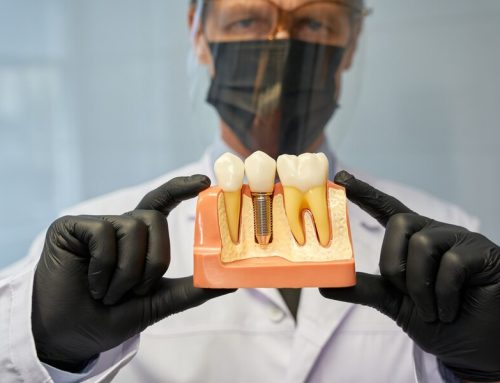The loss of teeth affects both a person’s physical health and has significant consequences for their appearance, speech, and chewing ability. This has led to the development of multiple treatment options to address the issue. Two common methods for replacing missing teeth are dental implants and dentures. But which one is the better option? Are implants suitable for everyone? In this article, we will explore these two methods, along with their advantages and disadvantages.
Advantages and Disadvantages of Dental Implants
Dental implants are recognized as an advanced and effective solution for replacing missing teeth. In this method, a metal or titanium base is surgically placed into the jawbone. Over time, the implant fuses with the bone through a process called osseointegration. Once the implant is securely integrated, an impression is taken, and a custom-made crown is fabricated and attached to the implant. This method has its own pros and cons, which we will examine below:
Advantages of Dental Implants Over Dentures
One of the main advantages of dental implants is their exceptional durability. Since the implant fuses with the jawbone, it provides superior chewing ability, significantly improving the patient’s quality of life. Additionally, implants are designed to look and feel like natural teeth, enhancing both aesthetics and comfort. Another major benefit is that implants help prevent bone and gum tissue loss by stimulating the jawbone, maintaining its structure.
Implants also eliminate common issues associated with dentures, such as slipping, speech difficulties, and chewing inefficiency. Finally, maintaining implants is straightforward, requiring only standard oral hygiene practices.
Disadvantages of Dental Implants Compared to Dentures
Despite their many benefits, dental implants also have some drawbacks. The cost of implants is significantly higher than that of dentures, which may be a limiting factor for some patients. Additionally, the procedure involves surgery, which can be a concern for certain individuals.
The treatment process can also be lengthy, sometimes taking up to six months to complete. Lastly, implants are not suitable for everyone—ideal candidates must have adequate jawbone density and good oral health.
Advantages and Disadvantages of Dentures
Dentures are a traditional method for replacing missing teeth. They consist of removable prosthetic teeth that sit on the gums, helping individuals eat and restore their smile. Like implants, dentures have their own advantages and disadvantages:
Advantages of Dentures Over Implants
Dentures offer certain benefits that may appeal to some patients. One of their main advantages is their lower cost compared to implants, making them a more economical option for those with financial constraints. Additionally, the treatment time for dentures is much shorter—patients can receive their prosthetics quickly with minimal recovery time. Since dentures do not require surgery, they eliminate concerns related to surgical risks and complications.
Disadvantages of Dentures Compared to Implants
Despite their affordability, dentures come with several drawbacks. One of the most significant issues is their lack of stability, as they may slip while eating or speaking. Another major disadvantage is bone and gum deterioration—the absence of a natural tooth root leads to gradual jawbone loss, which can alter facial structure over time. Some individuals may also experience speech difficulties due to the instability of dentures.
Are Dental Implants Suitable for Everyone?
Dental implants are one of the most advanced solutions for tooth replacement, offering numerous benefits. However, they are not suitable for all patients, and in certain cases, dentures may be a better alternative. Below, we examine the ideal conditions for implants versus dentures:
Ideal Candidates for Dental Implants
Individuals with sufficient jawbone density and a healthy immune system are good candidates for implants. Before proceeding, a thorough examination and imaging are necessary to assess the patient’s dental and bone condition. These evaluations help the dentist determine whether the patient qualifies for this treatment.
Limitations of Dental Implants
In some cases, dental implants may not be feasible. For example, individuals with uncontrolled diabetes, active cancer treatment, or immune disorders may face higher risks of infection and complications. Additionally, those with osteoporosis may lack the necessary bone strength to support implants. In such cases, dentures serve as a safer and more practical alternative.
Who Is a Good Candidate for Dentures?
Dentures are a suitable option for those who cannot undergo implant surgery. They are ideal for patients who have lost multiple teeth, prefer a non-surgical approach, or have medical conditions that make implants risky. Dentures are easy to place on the gums and do not require surgery. They help patients eat comfortably and maintain their appearance.
Implants vs. Dentures: Which Is the Better Choice?
Deciding how to replace missing teeth is a significant challenge for many dental patients. Below, we explore key factors to consider when choosing between implants and dentures:
1. Patient’s Age
Age plays a crucial role in determining the best option. Implants are considered a permanent solution, making them more appealing to patients under 60 who can benefit from them for many years. Older patients, especially those unwilling to undergo lengthy or invasive procedures, may prefer dentures for their simplicity and quick results.
2. Jawbone Density
Adequate jawbone density is essential for successful implant placement. Patients with bone loss due to injury, gum disease, or prolonged tooth absence may not qualify for implants unless they undergo bone grafting—a procedure that strengthens the jawbone before implant placement.
3. Functionality and Natural Feel
Comfort and functionality are critical factors. Studies show that implants provide greater stability and a more natural feel compared to dentures. A 2019 study found that patients using implant-supported dentures reported higher satisfaction with chewing and speech.
4. Oral Hygiene Commitment
Maintenance is another important consideration. Dentures require meticulous cleaning, while implants can be cared for like natural teeth. Patients who may struggle with denture upkeep might find implants more convenient, despite their higher cost.
Final Thoughts
The choice between implants and dentures depends on individual needs and financial circumstances. Dental implants offer durability, natural aesthetics, and superior functionality, while dentures provide an affordable and quick solution but come with certain limitations. Consulting with a dental specialist and carefully evaluating both options is essential for making the best decision. Patients should consider their unique conditions when choosing the right treatment.







Leave A Comment